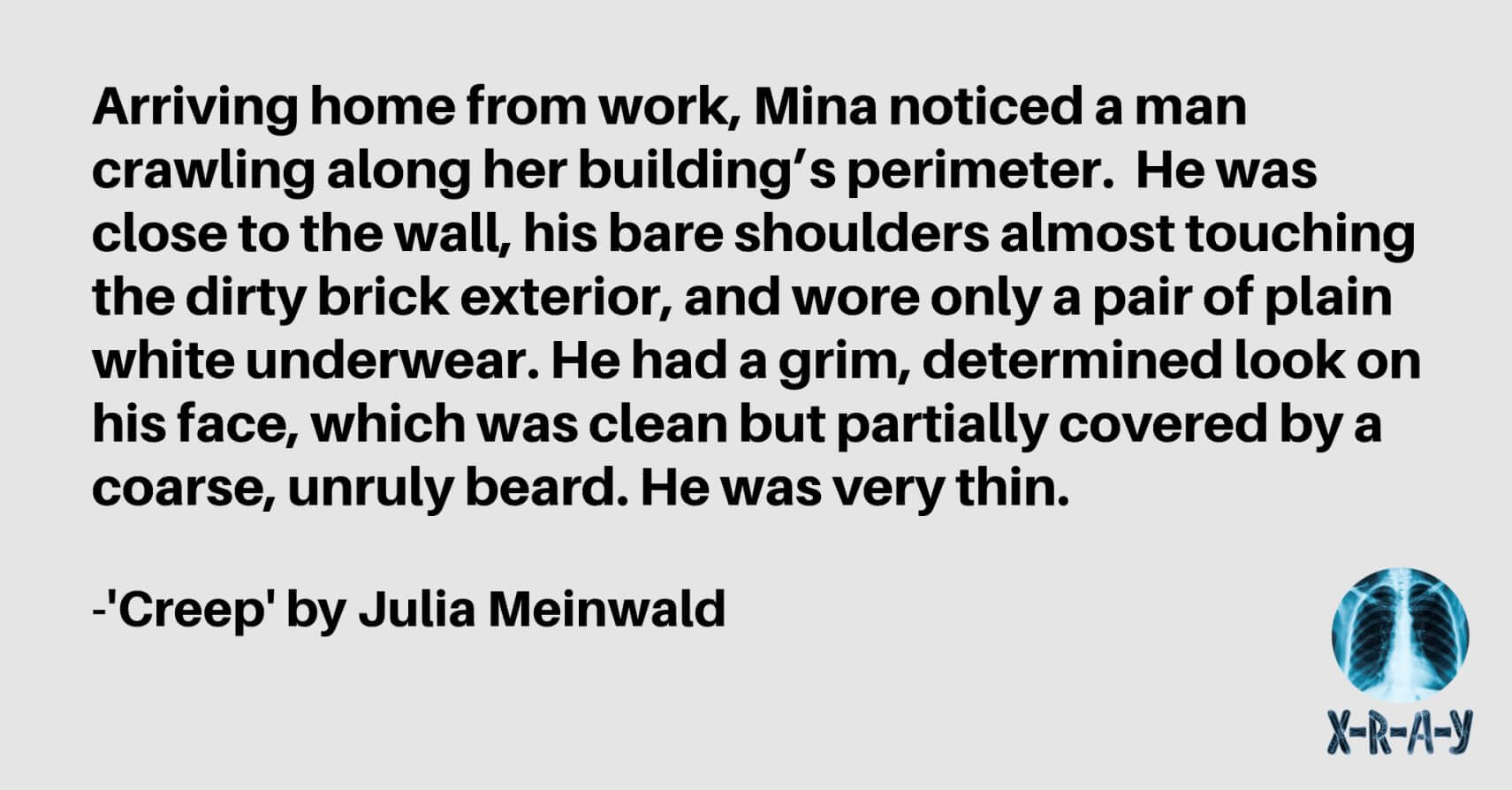Arriving home from work, Mina noticed a man crawling along her building’s perimeter. He was close to the wall, his bare shoulders almost touching the dirty brick exterior, and wore only a pair of plain white underwear. He had a grim, determined look on his face, which was clean but partially covered by a coarse, unruly beard. He was very thin. The man looked down at the ground as he crawled. Mina watched him, shifting her weight from one foot to the other, for a number of minutes. Only after he’d crept out of sight did she dash in the front door.
Generally, Mina tried not to look at the shabby bus stop on the corner of her apartment complex, the uneven patch of sidewalk, the building’s faded blue awning announcing its name: The Warwick Arms. It was a grand name for a run-down place. The lock on her apartment’s door frequently broke in one of two contradictory ways, either sticking such that she couldn’t get in, or refusing to lock on her way out. The paint on her walls flaked and chipped, and one of the three elevators was always broken. If she arrived home at the same time as a neighbor, she had to converse for too many minutes about the weather, the time of day, being tired, before the heavy doors finally opened to ferry her up to the fourteenth floor. (Everyone knows that it’s really the thirteenth floor in disguise.) Mina didn’t know the names of her neighbors, and would likely not recognize any of them outside the context of her building.
When she left for work the next morning, the man was still at it. His knees were now dirty and scabbed. His pace had not slowed or quickened. Could this be performance art? Or some eccentric fundraiser, with donors pledging dollars for each lap around the building? His expression was so serious, though. Mina had read a study once, about cats with injured brains. The injuries were located in a spot that affected the animals’ sense of navigation: they could only turn in one direction. Left unattended, they would walk in endless circles.
***
Every Saturday, Mina babysat her niece Anna, a chaotic blonde spring of sticky energy. She told her sister Lydia to meet her at the park for the dropoff, not wanting the young girl to see the crawling man. Anna held Mina’s hand as they walked towards the playground, though she argued that four is old enough that she didn’t need to. The girl would stop along the way to pick up discarded fast food boxes, seltzer cans, once a (thankfully empty) blood collection tube like the kind you’d see in a hospital. Mina was disturbed by the trash in the park, wondered whose job it was to collect it. She didn’t see any real harm in it though, and Anna regarded each treasure with respectful attention before Mina gingerly pried it from her hands.
At the playground, a dead rat was lying at the foot of the swingset. Anna jetted towards it, picked it up, and cradled it in her arms.
“Honey, put that down, please,” Mina said, trying not to sound afraid.
“She let me pet her.”
“Actually, I think it might be dead,” Mina said, hoping she wasn’t introducing the concept of mortality for the first time.
“No she’s not,” said Anna. Looking closer, Mina realized her niece was right. The rat’s abdomen was rising and falling in a ragged arrhythmia. Its eyes gazed blankly upward, as if asking for mercy.
“We don’t know if it’s sick though,” said Mina. The image of the rat rousing itself in a final death-twitch to bite Anna flashed through her mind, and she grabbed the creature by its tail and flung it out of Anna’s hands. It landed with a soft thump a few feet away. “We’re going to wash our hands,” she said, dragging Anna towards the grimy public park bathroom. “Now.”
Shaken, Mina walked a jittery lap around the park once Lydia had picked up Anna. With each step she said to herself, I’m fine, I’m fine, but she couldn’t quite dismiss the expression she remembered on the crawling man’s face, the sound of the rat’s wheezing breath. She had the unsettled feeling of being infected by some undefined threat. The sun set, and Mina walked home. She would make rice and melted cheese for dinner. She would watch last night’s episode of The Bachelor. It was just another day.
***
To her relief, there was no sign of the crawling man outside her apartment. Perhaps he was just on the far side of the building. Perhaps he had crawled away. She was alone in the elevator, which trundled her up to her floor without fanfare. Pushing into her apartment, Mina felt suddenly tired. She let her bag drop to the floor, and turned the corner to find the crawling man circumnavigating her kitchen. She froze in the doorway. He continued his slow circle, knees dragging against the off-white tile floor, eyes down. When he reached her feet, he lifted his head slowly. His watery blue eyes met hers.
“I mean you no harm,” he said in a soft, choked voice. An ant crawled out of his beard and across his face. He did not brush it away, but instead resumed his own slithering around the edge of the room.
Mina backed out of the doorway. She sat gingerly on her living room couch, unsure what to do. She could hear the shuffling sound of the man in the next room. Eventually, she tiptoed to the hallway and retrieved her phone from her purse. She brought it back to the couch and dialed 9-1-1.
“There’s someone in my house,” she whispered to the operator. After she hung up, she sat quietly, waiting for the police to arrive. She breathed a stuttering breath. The man crawled. She breathed. The man crawled. She breathed. The man crawled.

